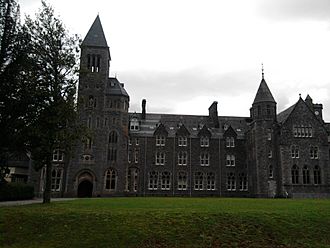Fort Augustus Abbey facts for kids
Quick facts for kids St. Benedict's Abbey |
|
|---|---|
 |
|
| Alternative names | Fort Augustus Abbey |
| General information | |
| Type | Benedictine monastery |
| Town or city | Fort Augustus, Inverness-shire |
| Country | Scotland |
| Coordinates | 57°08′42″N 4°40′34″W / 57.145°N 4.676°W |
| Construction started | 1876 |
| Completed | 1880 |
Fort Augustus Abbey, also known as St. Benedict's Abbey, was a Benedictine monastery located in Fort Augustus, Inverness-shire, Scotland. It was home to monks from the late 1800s until 1998.
Building the Abbey
The idea for Fort Augustus Abbey came from John Crichton-Stuart, 3rd Marquess of Bute. He wanted to bring back monasteries to Scotland. In 1874, the Marquess spoke with the leaders of the Anglo-Benedictine group. He promised a lot of money to help start a new monastery in Scotland.
His plan was that if two more monasteries were built, they would all form a new Scottish group. The leaders liked this idea. They decided to combine an old monastery called Lamspringe Abbey in Hanover with the new Scottish one. Lamspringe Abbey had been home to English monks from 1645 to 1803.
Raising Funds for the Project
Lamspringe Abbey had struggled because it didn't have enough money. But with Lord Bute's help, it seemed possible to restart it in Scotland. A monk named Dom Jerome Vaughan was put in charge of the project. He managed to collect enough money from people all over England, Scotland, and Ireland. This money, about £70,000, helped build a beautiful monastery.
The Abbey's Location
The land for the abbey in Fort Augustus was given by Simon Fraser, 13th Lord Lovat. This site included the buildings of an old fort. The fort was built in 1729 to help control the Jacobites in the Scottish Highlands. The Lovat family had bought the fort from the government in 1867.
Construction on the monastery buildings began in 1876 and finished in 1880. The buildings formed a square shape, about one hundred feet on each side. For about sixteen years, the monks also ran a school for boys from wealthy families in one part of the abbey.
Images for kids
 | Georgia Louise Harris Brown |
 | Julian Abele |
 | Norma Merrick Sklarek |
 | William Sidney Pittman |


